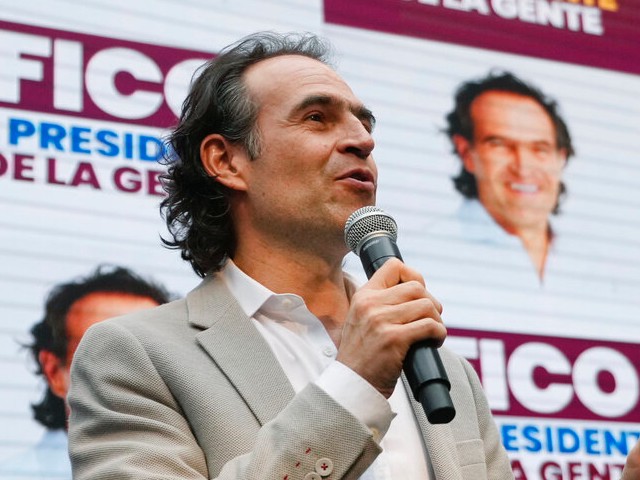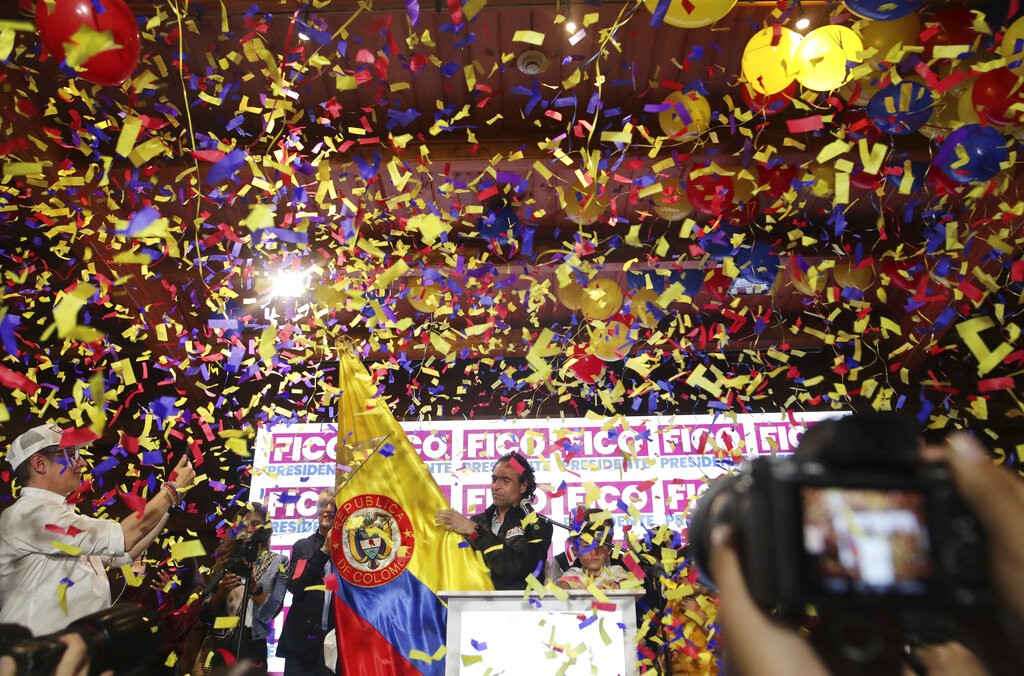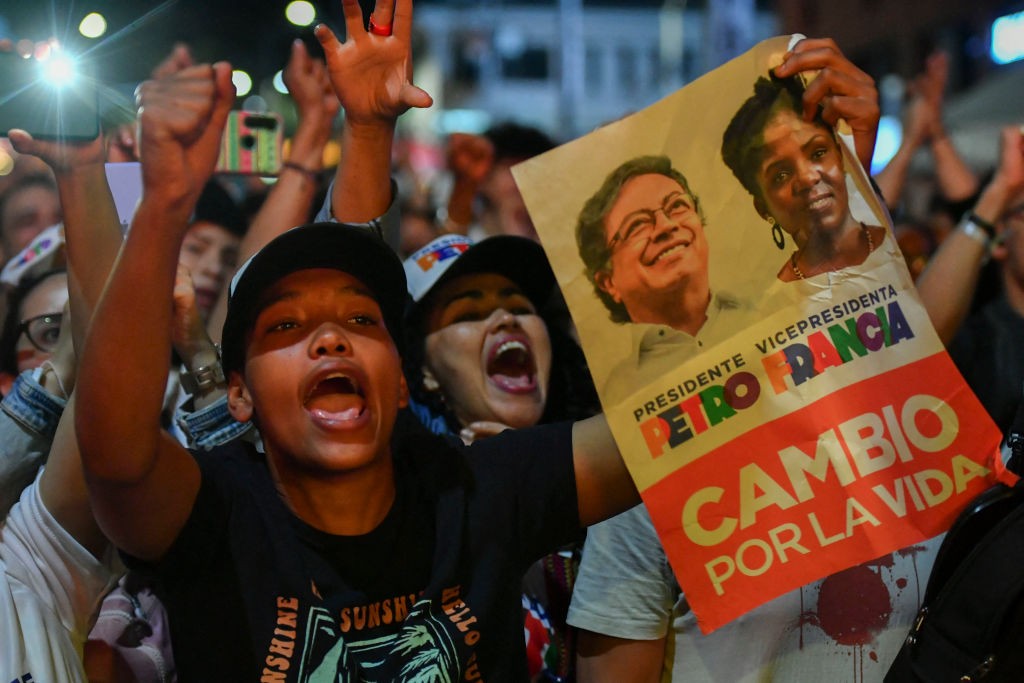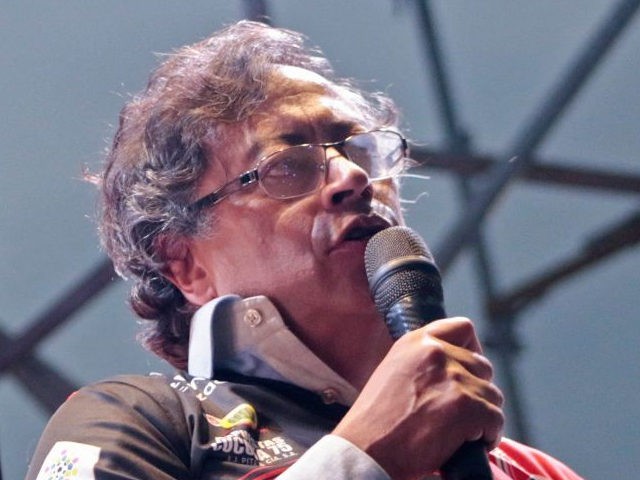CARACAS, Venezuela — Colombian citizens will head to the polls on Sunday, May 29, to choose who will be their nation’s president for the next four years.
Eight candidates will face off in this upcoming election, with polls currently favoring socialist and former guerrilla fighter Gustavo Petro.
Out of all candidates and participating political parties, the three main coalitions vying for the presidency are: The “Equipo por Colombia” (Team for Colombia) coalition, composed of center-right and right-wing parties backing up Federico Gutiérrez; the “Pacto Histórico por Colombia” (Historic Pact for Colombia) coalition, composed of left-wing parties backing Gustavo Petro; and the Centro Esperanza (Hope Center) coalition of centrist and center-left parties backing Sergio Fajardo.

Presidential candidate Federico Gutierrez speaks in Bogota, Colombia, Monday, March 28, 2022, ahead of the May 29 elections. (AP Photo/Fernando Vergara)
Other candidates and coalitions include Rodolfo Hernández from the “Liga de Gobernantes Anticorrupción” (League of Anti-Corruption Governors), John Milton Rodríguez from the “Colombia Justa Libres” (Fair and Free Colombia) coalition, Enrique Gómez Martínez from “Salvación Nacional” (Nacional Salvation), Luis Pérez from “Colombia Piensa en Grande” (Colombia Thinks Big), and Ingrid Betancourt from the Partido Verde Oxigeno (Oxygen Green Party).
Colombia’s constitution states that a candidate must obtain at least 50 percent plus one of the vote to win the election. Should neither candidate obtain this threshold on the day of the election, then a runoff election between the top two most voted candidates will take place on Sunday, June 19.
According to the latest polls, Leftist candidate Gustavo Petro is currently leading with a 43-percent vote intention, with conservative candidate Federico Gutiérrez trailing second with 27.7 percent. As neither candidate is projected to obtain more than 50 percent in the first round, a runoff election between these two is all but confirmed.
Federico “Fico” Gutiérrez, the conservative candidate, was the mayor of the city of Medellín from 2016 to 2019, where he achieved approval ratings of up to 96 percent. Medellín is a historically troubled city – once home to Pablo Escobar’s cartel – that has experienced a renaissance tied to conservative leadership and an elevated pop-culture profile in Latin America.

Presidential hopeful Federico Gutierrez touches a Colombian flag as he celebrates after winning the primaries of his coalition during legislative elections in Bogota, Colombia, Sunday, March 13, 2022. (AP Photo/Ivan Valencia)
Gutiérrez’s candidacy received the support of former President Álvaro Uribe Vélez (2002-2010) – still, the most prominent conservative politician in the country over a decade after leaving the presidency – after Óscar Iván Zuluaga, the candidate of Uribe’s party Centro Democrático (Democratic Center), withdrew his candidacy following the results of the March 2022 parliamentary elections in Colombia.
Uribe Vélez is a largely influential right-wing politician in Colombia and is considered a kingmaker for the presidencies of both Juan Manuel Santos (2010-2018) and Iván Duque (2018-2022). In 2015, Colombia approved a one-term limit for presidents, making Duque, who is also part of the Democratic Center, ineligible to run again. Santos served in Uribe’s administration but made dramatic political departures from Democratic Center as president, including negotiating with communist terrorists.
Gustavo Petro, the leftist candidate, is a former M-19 guerilla fighter and former mayor of Colombia’s capital city, Bogotá. This is the third time Petro has run for president. Petro ran in the previous 2018 presidential elections and lost against Duque.
If elected, Petro would become Colombia’s first leftist president — Colombia is an unheard-of case in Latin America of a country that has never been ruled by a leftist president.
Petro has had his own fair share of controversies in the past, from stating that he would vote for Joe Biden “without the least bit of doubt,” accusing a Colombian news channel of being “Neo-nazis,” and delivering political speeches while visibly drunk.
Petro has not been shy about expressing support for the Cuban communist regime and Venezuela’s “Supreme and Eternal Commander of the Revolution,” Hugo Chávez.
“In Cuba, as in Colombia, social dialogue is imposed. Living societies are those that move and achieve transformations from their dialogue and not from their self-destruction,” Petro said in a tweet during the days of the 2021 protests against Cuba’s communist regime.
“You lived in the times of Chávez and perhaps you thought he was a clown. You fooled yourself. You lived through the times of a great Latin American leader,” a tweet Petro posted on the day Chávez died read.
As is the case with most leftist politicians around the globe, Petro has attempted to distance himself from socialist dictator Nicolás Maduro and the perceived radioactivity the calamities wrought upon Venezuela by his socialist regime inflict upon leftist political movements that once were friendly to the Bolivarian cause.
After Maduro accused Petro and other leftist politicians in the region of being part of a “cowardly left,” Petro responded with a tweet saying: “I suggest Maduro stop his insults. Cowards are those who do not embrace democracy. Get Venezuela out of oil, take it to the deepest democracy, if you have to step aside, do it.”

Supporters of the socialist Colombian presidential candidate, Gustavo Petro, and his running mate, Francia Marquez, attend a rally called in Medellin, Colombia, on April 22, 2022. (JOAQUIN SARMIENTO/AFP via Getty Images)
In spite of the perceived distance between Petro and Maduro, possible ties between Petro and the Bolivarian Revolution are being investigated. Hugo Carvajal, a former member of the socialist regime of Venezuela and currently detained in Spain, has stated that he has evidence of Petro being among those who have directly received financing from Venezuela’s socialist regime.
While Carvajal has refused to testify against Petro, his lawyer has stated that Carvajal does, in fact, have evidence against Petro but is demanding guarantees beforehand amidst his possible extradition to the United States.
Colombian Senator Piedad Córdoba – who had a history of close ties with Hugo Chávez, to the point of being accused of having more influence than Nicolás Maduro himself – is among those that form part of Petro’s presidential campaign coalition. Petro has requested that Córdoba suspend any and all campaign activities following accusations against her that include engaging in corrupt business deals with Alex Saab, a key ally of the Maduro regime currently detained in the United States and being charged with money laundering.
One of Córdoba’s advisors alleges that it was Petro himself, not his former campaign official, who had close ties to the Venezuelan regime.
For more than 50 years, Colombian citizens have had to face ongoing terrorist threats from the Marxist National Liberation Army (ELN) and Revolutionary Armed Forces of Colombia (FARC) groups (the latter, who the Biden Administration has recently stripped of its terrorist label), whose activities include but aren’t limited to mass murder, rape, kidnappings, use of child soldiers, and drug trafficking. Colombia also saw an intense wave of leftist riots and national strikes in 2021 following president Duque’s unpopular tax proposal.
By February of 2022, President Duque had a 73-percent disapproval rating.
Christian K. Caruzo is a Venezuelan writer and documents life under socialism. You can follow him on Twitter here.

COMMENTS
Please let us know if you're having issues with commenting.